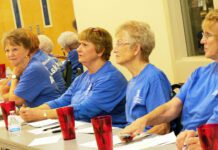54 Million Americans have disabilities; that’s 1/6. If you live long enough, we are all likely to experience a disability.
Disability is a feature of body or environment, inhibiting you from normal functioning in society. For example, people requiring wheelchairs aren’t necessarily disabled until buildings put in stairs.
Three common experiences for people with disabilities in church.
- Overlooked – no thought registered on the topic.
- Separated – ministry with/for disabled people.
- Mainstreamed – welcomed in with the rest, as long as no additional accommodations are necessary.
Integration Requires Good Theology
- I Corinthians 12:1-20 covers the concept of one body with many parts. We therefore need
an integrated approach. Overlooking the value giving potential of those with disabilities is a travesty, and a separated approach prevents the church body from benefiting from the fully. - “Let us think of ways to motivate one another to acts of love and good works.” Hebrews
10:24 - Just like Jesus had vision for Peter, we need a vision for what people can become.
- Did Moses have a speech impediment? Was the most powerful figure of the Old Testament disabled?
- For Jesus to become man, he took on disability.
Integration Starts with Leaders and Involves the Whole House Group
- Hebrews 13:7 indicates that the example of leaders is an inspirational lead to others.
- Find creative long-haul solutions to welcome disabled members.
- Start with people when they are young. Expose your kids to disabled people.
- Encourage self-advocacy by disabled people. They must assert what accommodations they
need.
Integration Requires Flexibility and Creativity
- People with wheel chairs might be hesitant about joining a group because of stairs or the need to rely on people to get up stairs. You need to insist that they are welcome and should come.
- One Xenos ministry house incorporated a handicap ready rental a few doors down.
- Figure out how to involve their input in group discussion and gifts into ministry teams.
- Offer a personal “buddy” to any children with disabilities that need special attention.
- Offer a translator at one service.
- Wheelchair friendly ramps, isles, and seating.
Word gets around fast in disabled communities. Don’t wait for them to come and then accommodate. Make the accommodations, use your church’s communication channels to make the accommodations known, and you’ll find word of mouth travels quickly.












